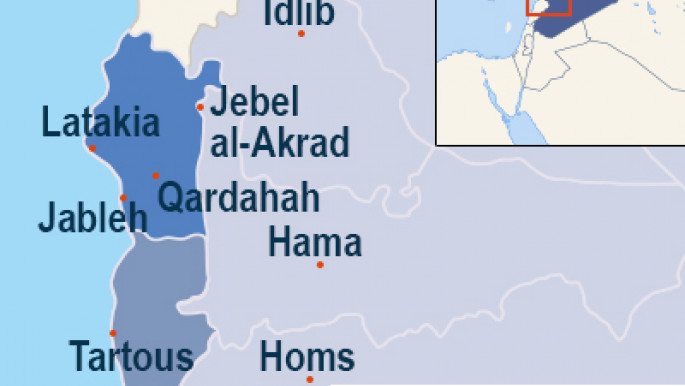Major battle for control of Syria's biggest city
Syria's armed forces advanced south of the second city of Aleppo on Friday in a fresh ground offensive backed by Russian warplanes, a monitoring group said.
Rebels in Aleppo province are also facing a major new offensive from the Islamic State group.
Since Moscow began its air war in support of Damascus on September 30, the Syrian army has launched assaults against rebels in at least four provinces with Russian aerial support, the Syrian Observatory for Human Rights said.
Russian air cover is backing offensives by Syria's army and allied militias in the central provinces of Homs and Hama, as well as Aleppo in the north and Latakia along the coast.
Aleppo assault
On Friday, the Syrian army pushed south from the provincial capital Aleppo city, where control is divided between regime and rebels forces, as Russian airstrikes pounded the villages of al-Hader and Khan Tuman and nearby localities.
"The Syrian army started a new front on Friday and advanced to take control of the villages of Abteen and Kaddar" about 15 kilometres [12 miles] south of Aleppo city, said Observatory head Rami Abdel Rahman.
He said "dozens" of Russian aerial attacks in the past 24 hours had struck the area, which is controlled by a patchwork of groups including rebels, Islamist fighters and al-Qaeda's Syria affiliate, al-Nusra Front.
Moscow has said its air war is targeting the Islamic State group, but rebels and their international backers say the air raids are concentrating on non-IS targets across the country.
On Thursday, the Syrian army with Russian air support fought to clear rebel fighters out of northern areas of Homs province.
But the Observatory, in a toll released on Friday, said most of those killed there in fighting the previous day were civilians.
"Eight children, 22 women, and 13 civilian men were killed in the fighting, shelling and strikes," Abdel Rahman said.
The violence also killed 17 rebel fighters, he added.
The Britain-based monitoring group said Russian warplanes on Friday struck rebel positions in Latakia, home to President Bashar al-Assad's ancestral village.
The Russian ministry of defence has said that air raids against rebel targets - which it claims are Islamic State group militants - have decreased since yesterday.
"The intensity of the sorties... has slightly decreased in the past day," because "the front line with the terrorist groups of [IS] is changing as a result of active offensives by the Syrian armed forces," a statement said.
The latest strikes targeted Damascus, Idlib, Hama, Deir Ezzor, and Aleppo provinces.
"The militants are retreating, trying to set up new positions and change the logistic system providing them with ammunition, weaponry and materials," the ministry said.
 |
Foreign support
French President Francois Hollande said on Friday that the Russian intervention would not save Assad, after an EU summit called for a political transition to a new leader.
"Russia's intervention from this point of view can bolster the regime but will not save Bashar," Hollande told a press conference in Brussels.
Russia's entry into the conflict has raised fears of a potential confrontation with the US-led coalition that began airstrikes against IS in Syria and Iraq more than a year ago.
Washington this week rebuffed Moscow's suggestion of broader talks on Syria, prompting criticism from Putin on Thursday.
"I believe this is an unconstructive position," he said during a visit to Kazakhstan. "It looks like they have nothing to talk about."
A US official said the Pentagon was poised to boost its supply runs to rebels who can prove they are fighting IS fighters in northern Syria.
"As they demonstrate results, the packages will get heavier and US strikes will occur in places that are advantageous to their operations," the official, speaking on condition of anonymity, told AFP Thursday.
Meanwhile, a senior official in key regional Syrian ally Iran said Tehran would consider sending fighters to aid Damascus if they were requested.
"If Syria makes a request, we will study the request and make a decision," said Alaedin Boroujerdi, chairman of parliament's national security and foreign policy committee.
Turkey and Saudi Arabia, two of Assad's fiercest opponents, warned Russia of the consequences of its foray into the conflict.
"Russia is making a big mistake," Turkish Foreign Minister Feridun Sinirlioglu told reporters after talks Thursday in Ankara with Saudi counterpart Adel al-Jubeir.
"What it does will bring no meaning or benefit, other than delaying the transition process to help Syria out of the chaos," he added.
Turkey said earlier this month that Russian aircraft operating in Syria twice violated the air space of the key NATO member.
![Palestinians mourned the victims of an Israeli strike on Deir al-Balah [Getty]](/sites/default/files/styles/image_684x385/public/2024-11/GettyImages-2182362043.jpg?h=199d8c1f&itok=xSHZFbmc)


![The law could be enforced against teachers without prior notice [Getty]](/sites/default/files/styles/image_684x385/public/2178740715.jpeg?h=a5f2f23a&itok=hnqrCS4x)
 Follow the Middle East's top stories in English at The New Arab on Google News
Follow the Middle East's top stories in English at The New Arab on Google News

![Palestinian journalists in West Bank [Getty]](/sites/default/files/styles/image_330x185/public/2167088057.jpeg?h=a5f2f23a&itok=smdkN-46)
